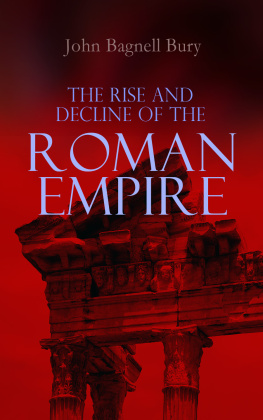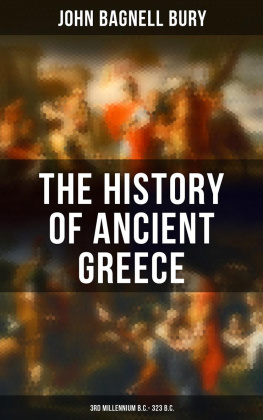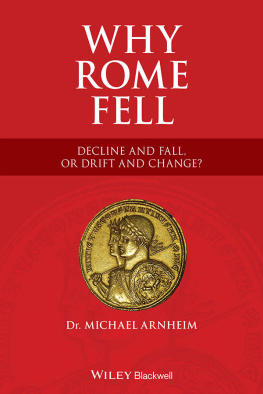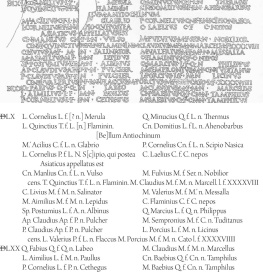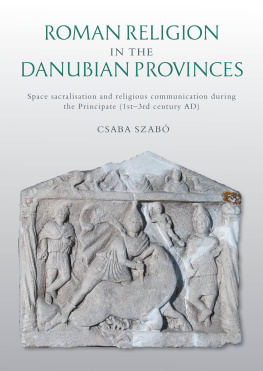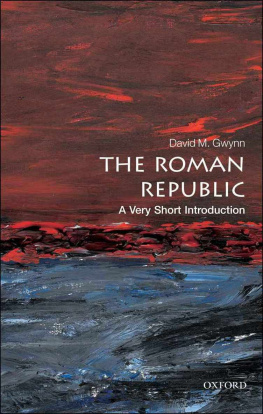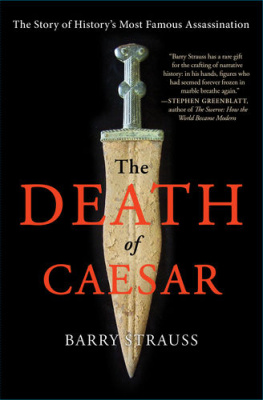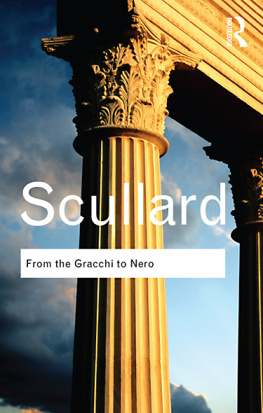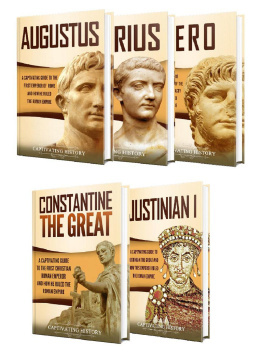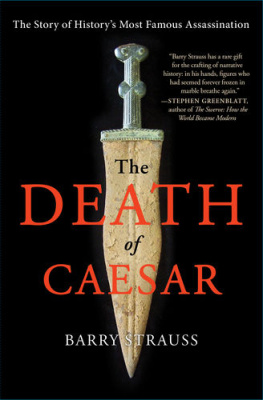Chapter I.
From the Battle of Actium to the Foundation of the Principate
C. Julius Cesar, the triumvir and the founder of the Roman Empire, was the grandnephew of C. Julius Caesar, the dictator, his adoptive father. Originally named, like his true father, C. Octavius, he entered the Julian family after the dictators death, and, according to the usual practice of adopted sons, called himself C. Julius Caesar Octavianus. But the name Octavianus soon fell into disuse, and by his contemporaries he was commonly spoken of as Caesar, just as Scipio Aemilianus was commonly called Scipio.
The victory of Actium (Sept. 2, 31 B.C.), and the death of Marcus Antonius (Aug. 1, 30 B.C.) placed the supreme power in the hands of Caesar, for so we may best call him until he becomes Augustus. The Roman world lay at his feet and he had no rival. He was not a man of genius and his success had perhaps been chiefly due to his imperturbable self-control. He was no general; he was hardly a soldier, though not devoid of personal courage, as he had shown in his campaign in Illyricum. As a statesman he was able, but not creative or original, and he would never have succeeded informing a permanent constitution but for the example of the great dictator. In temper he was cool, without ardor or enthusiasm. His mind was logical and he aimed at precision in thought and expression. His culture was wide, if superficial; his knowledge of Greek imperfect. In literary style he affected simplicity and correctness; and he was an acute critic. Like many educated men of his time, he was not free from superstition. His habits were always simple, his food plain, and his surroundings modest. His family affections were strong and sometimes misled him into weakness. His presence was imposing, though he was not tall, and his features were marked by symmetrical beauty; but the pallor of his complexion showed that his health was naturally delicate. It was due to his self-control and his simple manner of life that he lived to be an old man.
The successes of Caesar had not been achieved without the aid of others. Two remarkable men, devoted to his interests, stood by him faithfully throughout the civil wars, and helped him by their counsels and their labors. These were M. Vipsanius Agrippa and C. Cilnius Maecenas. As they helped him not only to win the empire, but also to wield it after he had won it, it is necessary to know what manner of men they were.
Of Agrippa we know strangely little considering the prominent position he occupied for a long and important period, and the part, he played in the history of the world. From youth up he had been the companion of Caesar, and he was always content to take the second place. His military ability stood Caesar in good stead, notably in the war with Sextus Pompeius, and on the day of Actium. He had first distinguished himself at the siege of Perugia (41 B.C.), and, subsequently, his victories over the Germans beyond the Rhine established his military fame. His success was due to his own energy, for he had no interest, and, belonging to an obscure gens, he was regarded by the nobility as an upstart. He was not, perhaps, a man of culture, but his tastes were liberal. His interest in architecture was signalized by many useful buildings; and Gaul owed him a great debt for the roads which he constructed in that country. In appearance he is said to have been stern and rugged; in temper he was reserved and proud. He was ambitious, but only for the second place; yet he was the one man who might have been a successful rival of his master.
Maecenas resembled Agrippa in his unselfish loyalty to Caesar; but his character was very different. Like Agrippa, he did not aspire to become the peer of their common master; but while the heart of Agrippa was set on being acknowledged as second, Maecenas preferred to have no recognized position. Agrippa's excellence was in the craft of war; while Maecenas cultivated the arts of peace. Agrippa had forwarded the cause of Caesar by his generalship; Maecenas aided him by diplomacy. It will be remembered how the latter negotiated the treaties of Brindisi andMisenum. During the campaigns which demanded the presence of Caesar, Maecenas conducted the administration of affairs in Italy, and watched over the interests of the absent triumvir. Until his death, (8 B.C.) he continued to be the trusted friend and adviser, in fact, the alter ego of Caesar; and he had probably no small share in making the constitution of the Empire. But he always kept himself in the background. He was content with the real power which he enjoyed by his immense influence with Caesar; he despised offices and honors. It is characteristic of the man that he refused to pass from the equestrian into the senatorial order. He could indeed afford to look down upon many of the nobles; for he came of an illustrious Etruscan race. In his tastes and manner of life he was unlike both Agrippa and Caesar. He was neither rough nor simple. A refined voluptuary, he made an art of luxury; and it was quite consistent that ambition should have no place in his theory of life. When affairs called for energy and zeal, no one was more energetic and unresting than Maecenas; but in hours of ease he almost went beyond the effeminacy of a woman. Saturated with the best culture of his day, he took an enlightened interest in literature. Of the circle of men of letters which he formed around himself there will be an occasion to speak in a future chapter.
Such were the men who helped Caesar to win the first place in the state; and who, when he had become the ruler of the world, devoted themselves to his service without rivalry or jealousy. Agrippa became consul for the second time in 28 B.C., with the triumvir for his colleague; and his friendship with Caesar was soon cemented by a new tie. He married Marcella, the daughter of Octavia, Caesar's sister, by her first husband, C. Marcellus.
The battle of Actium decided between Antonius and Caesar. But it also decided a still greater question. It decided between the East and the West. For the Roman world had been seriously threatened by the danger of an Oriental despotism. The policy of Antonius in the East, his connection with Cleopatra, the idea of making Alexandria a second Rome, show that if things had turned out otherwise at Actium, Egypt would have obtained an undue preponderance in the Roman State, and the empire mighthave been founded in the form of an Eastern monarchy. Caesar recognized the significance of Egypt, and took measures to prevent future danger from that quarter. It was of course out of the question to allow the dynasty of Greek kings to continue. But instead of forming a new province, Caesar treated the land as if he were, by the right of conquest, the successor of Cleopatra, and of Ptolemy Caesarion, whom he had put to death. He did not, indeed, assume the title of king, but he appointed a prefect, who was responsible to himself alone, and was in every sense a viceroy; and, as the lord of the country, he enacted that no Roman senator should visit it without his special permission. The first prefect of Egypt was C. Cornelius Gallus, with whose help Caesar had captured Alexandria. The inhabitants of Egypt were debarred from the prospect of becoming Roman citizens, and no local government was granted to the cities.
The treasures of Cleopatra enabled Caesar to discharge many pressing obligations. He was able to pay back the loans which he had incurred in the civil wars. He was able also to give large donatives to the soldiers and the populace of Rome. The abundance of money which the conquest of Egypt suddenly poured upon Western Europe helped in no small measure to establish a new period of prosperity. After many dreary years of domestic war and financial difficulties, men now saw a prospect of peace and plenty.
But, above all, the booty of Egypt enabled Caesar to satisfy the demands of 120,000 veterans. Immediately after Actium he had discharged all the soldiers who had served their time, but without giving them the rewards which they had been led to expect. These veterans belonged both to Caesar's own army and to that of Antonius which had capitulated. Seeing that they would be of little importance after the conclusion of the civil wars, they made a stand as soon as they reached Italy, and demanded that their claims should be instantly satisfied.

